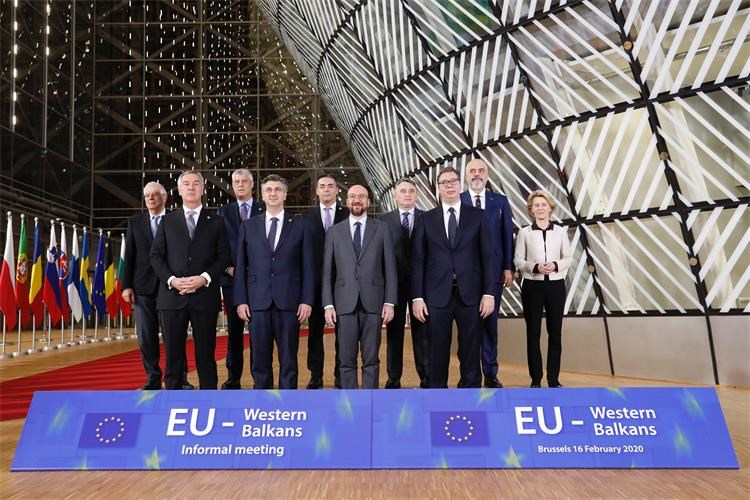


As premier of the country presiding the Council, he attended an informal working dinner of European Council President Charles Michel, European Commission President Ursula von der Leyen and EU High Representative for Foreign Affairs and Security Policy Josep Borrell with the leaders of Croatia's six Southeast European neighbours which are candidates or potential candidates for EU membership.
The meeting was held as part of preparations for a summit of leaders of all EU member states leaders and Western Balkan countries in Zagreb on May 6-7.
Plenkovic described the meeting as very good and timely. "We positioned the topic of Southeast Europe high on the agenda of EU institutions," he said, adding that Greece, Austria and Italy had announced such preparatory meetings prior to the Zagreb Summit.
"This means that we have mobilised EU member states about this topic to a level that didn't exist. Most important for us before the Zagreb meeting is to resolve the issue of the opening of negotiations with North Macedonia and Albania, and we will try to have that decision adopted in March."
Plenkovic said he wanted the Commission to present in Zagreb a strong investment package for Southeast Europe, that summits between the EU and the countries in that region be held at least every two years, and that those countries gradually meet membership criteria and raise their citizens' living standards on the membership journey. "That will be a big, positive legacy of the Croatian presidency of the Council of the EU for our six neighbouring countries."
Plenkovic said that next week, at an EU27 summit, he would talk which the prime ministers of Denmark and the Netherlands, which had reservations in October regarding the opening of negotiations with Albania. France, which had the strongest objections, has changed its position after the Commission put forward a new accession negotiations methodology.
Plenkovic said that during Croatia's EU presidency he would also try to solve the visa liberalisation issue for Kosovo citizens. "Croatia believes Kosovo has met the criteria for waiving visas. There are several countries which don't share that view but I believe that, in intensive negotiations within the Council and in a generally better atmosphere, we could find a solution to an important issue for Kosovo citizens."
Prior to the meeting, von der Leyen said it was in the EU's geostrategic interest to have the closest relations possible with Western Balkan countries, confirming that the Commission was preparing an investment package for the region for the Zagreb Summit.
Michel said he expected honest, open and constructive talks on partnership with the leaders of the six Western Balkan countries.
PM: Michel's draft EU budget has positive elements for Croatia
Croatian Prime Minister Andrej Plenkovic on Sunday described European Council President Charles Michel's draft EU 2021-27 budget as an attempt at a compromise that still needed a lot of work, saying he was pleased the draft took into consideration Croatia's most important demands.
"I think Michel tried to find a compromise, but there will still be many difficult and demanding negotiations this week," he said in Brussels.
On Friday, Michel proposed a €1,094 billion budget for the EU in the 2021-27 period, which is 1.074% of the 27 member states' gross national income. The European Commission has proposed a €1,135 billion budget (1.114% of the GNI).
Although Michel is proposing less funds for the cohesion policy than the Commission and in relation to the 2014-20 budget, he is proposing a somewhat different distribution between poor and rich regions. Regions whose GDP is above 75% of the European average would receive more money and those whose GDP per capita is above 100% of the European average would lose €7 billion.
Croatia's two statistical regions, Adriatic Croatia and Continental Croatia, are below 75% of the European average. As of 2023, Croatia will have four statistical regions. Three will remain below 75% of the European average while the City of Zagreb GDP is above it.
Michel's proposal clearly reflects two demands which Plenkovic has been underlining in the EU budget negotiations - to consider the fact that Croatia is the youngest member state which has utilised only one seven-year EU budget and to take account of the population losses in a number of the member states, including Croatia.
Michel's proposal envisages a separate paragraph for Croatia which says that less developed regions in the member states which utilised only one cohesion policy programme period are entitled to an additional allocation of €300 million for their least developed regions. Only Croatia fits this description. The proposal also envisages additional funds for countries with big population losses.
"That paragraph is the fruit of our talks and the interpretation of the status Croatia has as the youngest member state. We also included the population issue which, after Commission President Ursula von der Leyen, was also acknowledged by... Michel, meaning that there are member states which have the problem of a part of their citizens leaving for more developed member states and therefore it's necessary to find adequate funds for the population policy," Plenkovic said.
He reiterated, however, that there was still a lot of work before a favourable agreement on the next EU budget was reached. "But we are on the right track, we will negotiate more, we have work to do and Croatia and its citizens deserve to have adequate funds also in the next seven years because that was the point of our EU membership."
Text: Hina